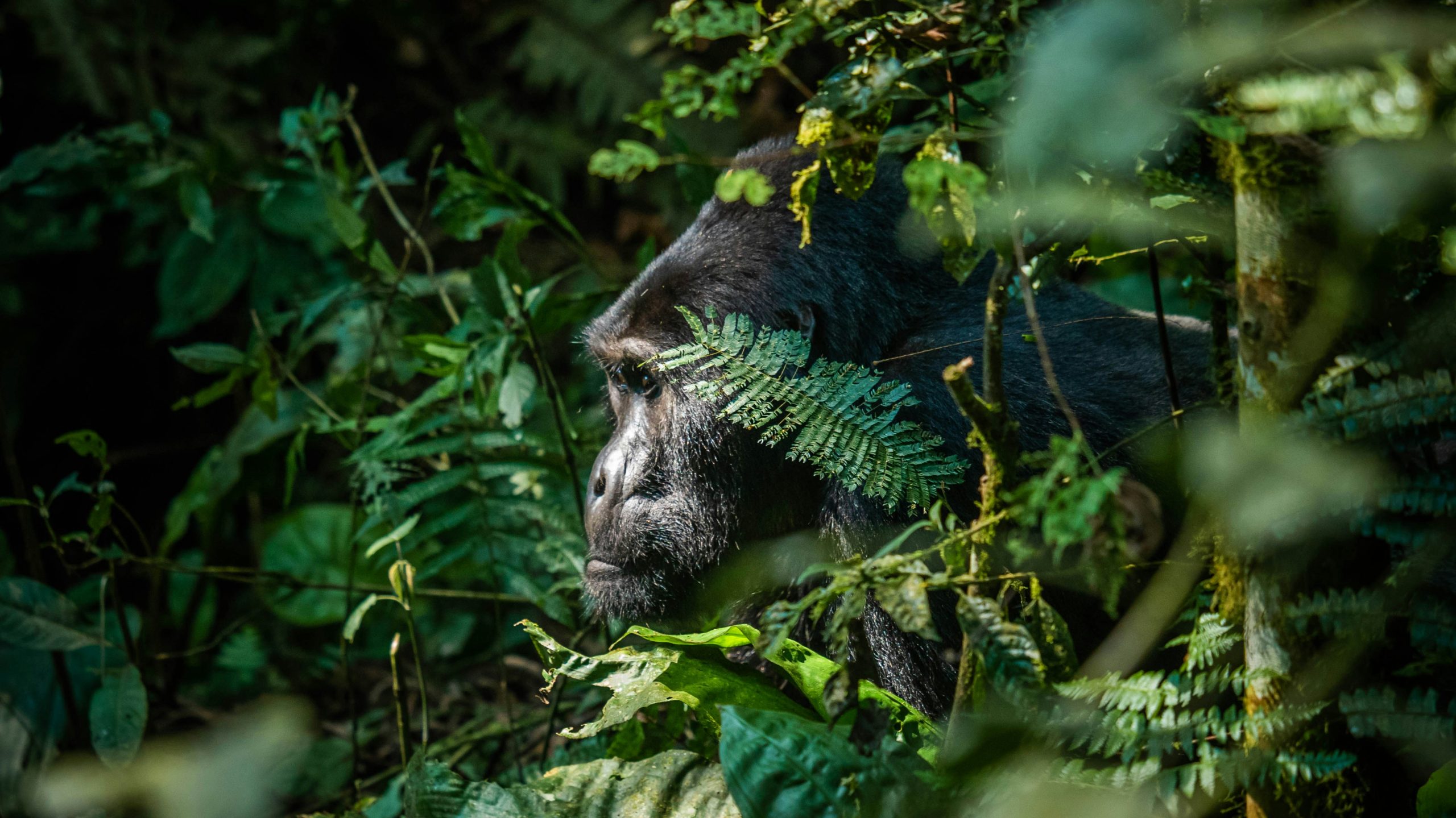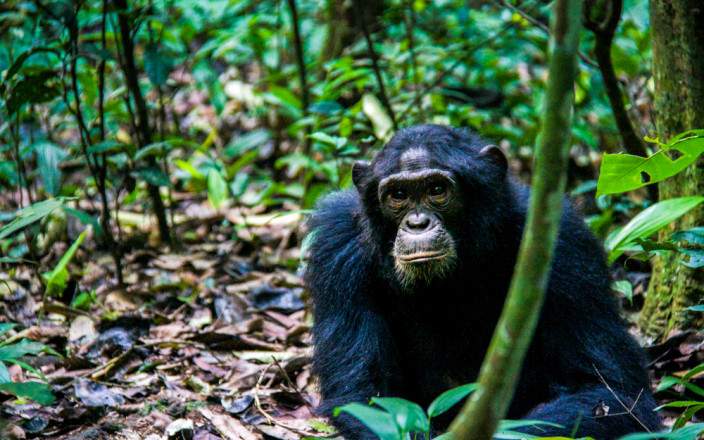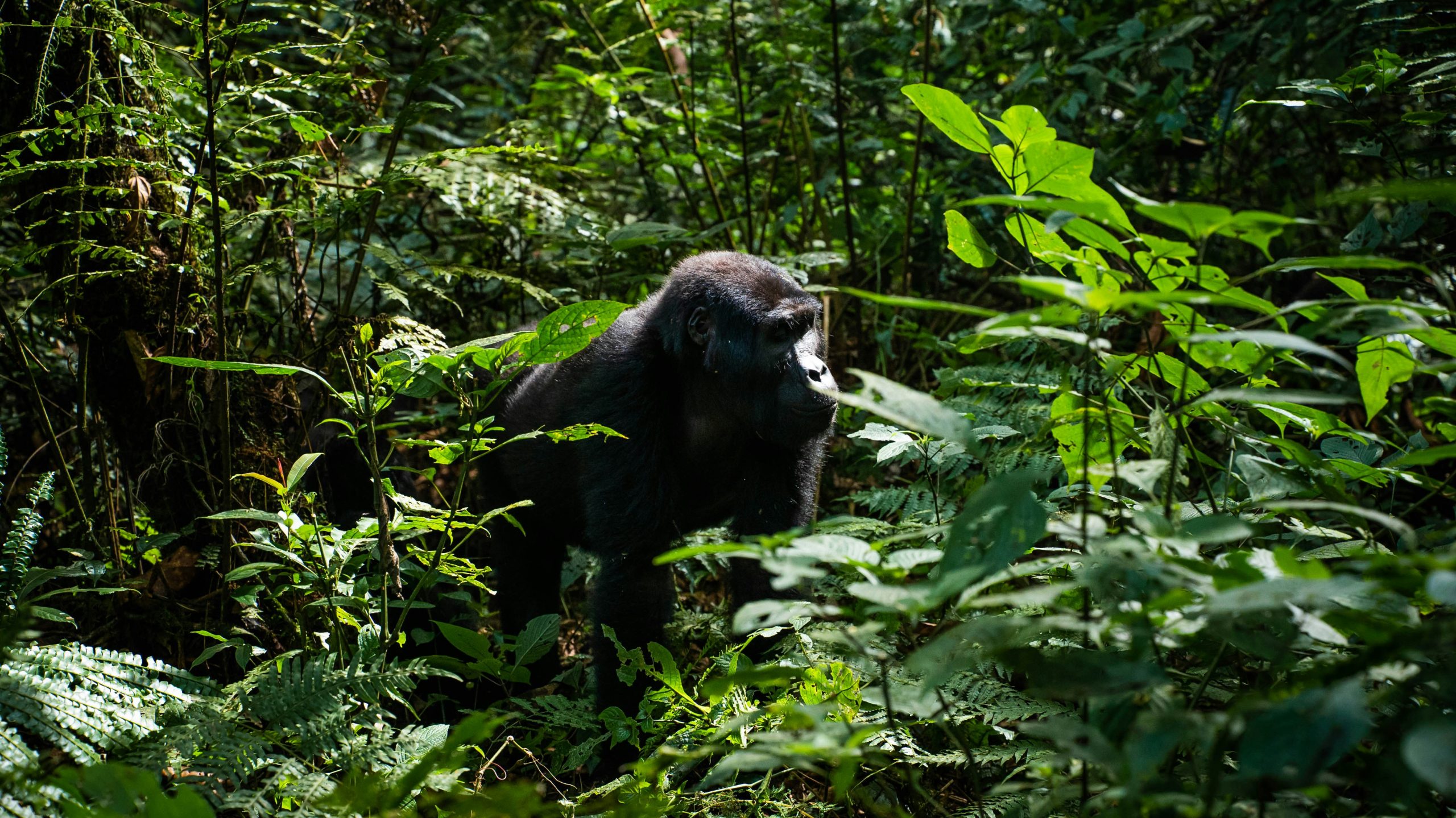Uganda’s Ultimate Gorillas & Chimps: Dual Habituation Treks: Experience Uganda’s only dual gorilla and chimp habituation trek—4 hrs with gorillas in Bwindi, full day with chimps in Kibale. Book your eco‑adventure today.
Embark on Uganda’s only dual ape habituation experience: four immersive hours with mountain gorillas in Bwindi’s Rushaga sector, followed by a full‑day chimpanzee habituation trek in Kibale National Park. This exclusive journey blends eco‑friendly primate tourism, conservation insights, and authentic Batwa cultural interactions, all under Agasaro Safaris’ expert care.
Gorilla Habituation Experience in Bwindi’s Rushaga Sector
The Gorilla Habituation Experience allows for an extended, four-hour encounter with a semi-habituated gorilla family, accompanied by researchers and trackers. This process is crucial for acclimating gorillas to human presence, aiding in their conservation.

Key Details:
- Location: Rushaga sector, Bwindi Impenetrable National Park
- Duration: Full-day trek with 4 hours of gorilla interaction
- Permit Cost: $1,500 per person
- Group Size: Maximum of 4 participants per day
- Minimum Age: 15 years
The Rushaga sector is unique in offering the Gorilla Habituation Experience and is home to several habituated gorilla families: bwindinationalparkuganda.com
- Bikyingi Family: Led by silverback Bikyingi, this group has 21 members and was formed by combining individuals from the Mishaya family and wild gorillas.
- Mucunguzi Family: Dominated by silverback Mucunguzi, this family has 8 members and was formed after splitting from the Bweza family.
- Rwigi Family: A newly habituated group with 6 members, led by silverback Rwigi, who broke away from the Kahungye family.
- Kahungye Family: Initially comprising 27 members, this family is now led by silverback Rumanzi and has more than 14 members.
- Busingye Family: Formed after breaking away from the Kahungye family, this group has 9 members and is led by an aggressive silverback named Busingye.
- Mishaya Family: Led by silverback Mishaya, this group was formed after splitting from the Nshongi family and comprises 7 members.
These families offer unique insights into gorilla social structures and behaviors, making the habituation experience in Rushaga truly exceptional.
Related Blog: Gorilla Trekking vs Gorilla Habituation
What to Expect During the Gorilla Habituation Experience (GHEX)
1. Early Morning Briefing
Your day begins with a briefing at the Rushaga visitor center around 7:30 AM. Here, you’ll meet your guides, researchers, and trackers who will accompany you throughout the experience.
2. Trekking into the Forest
The trek to locate the gorilla family can take several hours, depending on their location. The terrain is often steep and dense, requiring a moderate level of physical fitness.
3. Observing the Gorillas
Once the gorillas are located, you’ll spend up to four hours observing their behavior, social interactions, feeding habits, and more. This extended time allows for a deeper understanding of their daily lives and social structures.
4. Participation in the Habituation Process
During the GHEX, you’ll assist researchers in the habituation process by maintaining a non-threatening presence, helping the gorillas become accustomed to human observers.
Chimpanzee Habituation Experience in Kibale Forest
Kibale Forest National Park, known as the “Primate Capital of the World,” is home to over 1,500 chimpanzees. The Chimpanzee Habituation Experience (CHEX) provides a full-day opportunity to observe a chimpanzee troop in their natural habitat; from the time they wake up to when they nest for the night. Uganda Wildlife Authority

Key Details:
- Location: Kibale Forest National Park
- Duration: Full-day experience
- Permit Cost: $300 per person
- Group Size: Limited to 4 participants per day
- Minimum Age: 12 years
Participants join researchers in the field, contributing to the habituation process, which can take up to three years. The experience involves tracking the chimps through the forest’s rugged terrain, observing their behaviors, social interactions, and daily activities.
Beyond chimpanzees, Kibale Forest is home to 13 primate species, including red colobus monkeys and L’Hoest’s monkeys, as well as a variety of bird species and other wildlife.
Habituated Chimpanzee Communities in Kibale Forest
Kibale Forest hosts several chimpanzee communities at various stages of habituation:
- Kanyanchu Community: The most visited group, offering high chances of sightings.
- Kanyawara Community: Comprises 50 to 60 individuals and is open to tourists.
- Sebitoli Community: Primarily reserved for research purposes.
- Ngogo Community: Located in the center of the park, this is one of the largest known chimpanzee communities, with over 200 individuals.
These communities provide unique insights into chimpanzee social structures and behaviors, enhancing the habituation experience.
What to Expect During Chimpanzee Trekking -CHEX
Participants join a team of researchers and trackers to locate and observe a chimpanzee community that is in the process of becoming accustomed to human presence. The day involves:
- Early Morning Tracking: Begin before dawn to find the chimpanzees as they leave their nests.
- Behavioral Observation: Spend the day observing feeding, grooming, social interactions, and other behaviors.
- Habituation Process: Learn about the methods used to gradually acclimate chimpanzees to human observers, a process that can take up to three years.
- Photography Opportunities: Capture moments of chimpanzees in their natural environment, noting individual personalities and group dynamics.
The experience is more challenging than standard chimpanzee trekking, as it involves navigating through dense forest and following the chimps as they move throughout their territory.
Related Blog Article: A Guide To Chimpanzee Trekking In Uganda, Rwanda & Tanzania
5-Day Itinerary: Dual Great-Ape Habituation Trek
Day 1: Arrival in Entebbe and transfer to Kibale Forest.
Day 2: Full-day Chimpanzee Habituation Experience in Kibale.
Day 3: Transfer to Bwindi’s Rushaga sector.
Day 4: Gorilla Habituation Experience in Bwindi.
Day 5: Cultural visit to a Batwa community and return to Entebbe.
This itinerary offers a balanced blend of primate encounters and cultural immersion, ensuring a comprehensive Ugandan adventure with a dual great ape habituation Uganda itinerary.
Recommended Eco-Lodges
Eco-lodges near Bwindi and Kibale for primate safaris
Kibale Forest:
- Kibale Lodge: Offers luxury accommodations with stunning views of the Rwenzori Mountains.
- Primate Lodge Kibale: Located within the park, providing easy access to chimpanzee tracking.
Bwindi – Rushaga Sector:
- Gorilla Leisure Lodge: Eco-friendly lodge nestled in the forest, offering comfort and proximity to gorilla trekking starting points.
- Rushaga Gorilla Haven Lodge: Provides panoramic views and cultural experiences with local communities.
These lodges are committed to sustainable tourism, ensuring minimal environmental impact while providing exceptional comfort.
Cultural and Scenic Add-Ons
- Batwa Cultural Experience: Engage with the indigenous Batwa community to learn about their traditions and way of life.
- Lake Bunyonyi Boat Tour: Explore Uganda’s deepest lake, dotted with 29 islands, offering serene landscapes and birdwatching opportunities.
- Lake Mburo Boat Safari: Spot hippos, crocodiles, and a variety of bird species on a tranquil boat ride.
These add-ons enrich your safari experience, providing insights into Uganda’s diverse cultures and ecosystems.
Travel Health & Ethical Considerations
- Malaria: Risk is low in highland areas, but prophylactics are recommended
- Vaccines: Yellow fever, hepatitis A & B, typhoid, and COVID-19 (check latest requirements)
- Fitness: A moderate to high level of fitness is necessary for both treks
- Ethical Guidelines:
- Keep at least 7 meters away from primates
- No flash photography
- Wear masks if required by guides
- Conservation Impact: Every permit funds veterinary care, habitat protection, and anti-poaching operations
Booking and Preparation Tips
- Advance Booking: Due to limited daily permits, it’s advisable to book your CHEX and GHEX permit at least 3 to 6 months in advance, especially during peak seasons (June–August and December–February).
- Physical Fitness: The experience involves trekking through dense forest; a moderate level of fitness is recommended.
- What to Bring: Sturdy hiking boots, rain gear, insect repellent, and a good camera are essential.
- Health Precautions: Ensure you have the necessary vaccinations and consult with a healthcare provider before your trip.
Best Time to Visit Uganda for Habituation Treks
- Dry Seasons:
- June to September
- December to February
- These months offer the best conditions for trekking and photography
Frequently Asked Questions (FAQ’s)
What makes habituation different from regular trekking?
Habituation involves longer interactions (4 hours for gorillas, a full day for chimps) with groups still getting used to humans. Trekking is typically shorter with already-habituated groups.
How difficult are the treks?
Both are moderately strenuous. Expect uphill hiking, humidity, and uneven paths.
Are permits refundable?
Permits are non-refundable but transferable under specific Uganda Wildlife Authority guidelines.
How do I obtain permits?
Book through a trusted tour operator or directly with Uganda Wildlife Authority.
Can children participate?
Minimum age is 15 for gorilla habituation, 12 for chimpanzee habituation.
Final Thought
The Dual Great-Ape Habituation Trek in Uganda is not just a safari—it’s an emotional and educational immersion into the wild. It’s for those who want more than a glimpse—for those seeking a bond.
Whether you’re watching a silverback assert his dominance or witnessing a chimp mother cradle her baby, these are the moments that stay with you forever. And with each visit, you become part of a greater mission: the protection and celebration of our planet’s most intelligent and vulnerable wildlife.
Book this unforgettable journey now and walk with the wild in Uganda.
